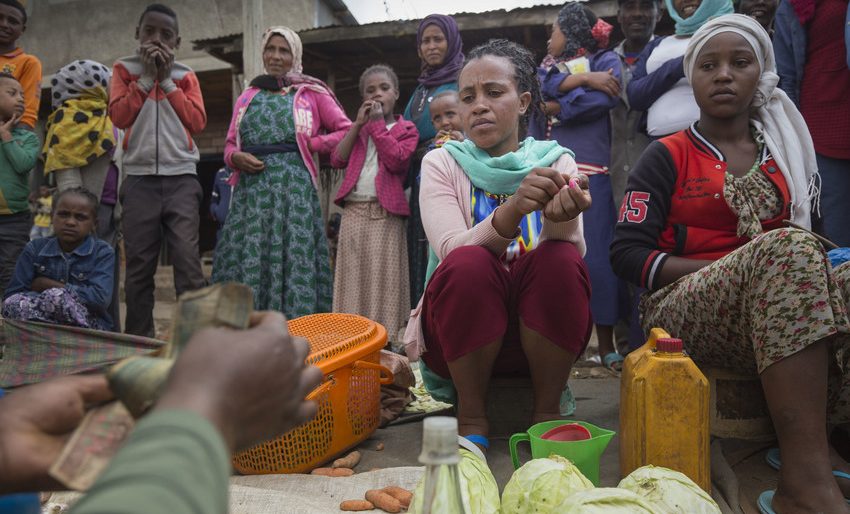Why is tracking CVA considered a challenge, and will applying minimum requirements help to make progress?

How much humanitarian aid is delivered as cash and voucher assistance (CVA)? An innocent enough enquiry, which may not have quite opened Pandora’s box, but has released a few cans of worms. This is a very technical topic and has a lot to do with the complexities and limitations of organizational and interagency reporting systems and standards. At the same time, the ensuing discussions have often cut to the heart of core debates and perceptions of what CVA is and ought to be within the framework of humanitarian aid.
Over the last few years, the Tracking CVA sub-workstream of the Grand Bargain Cash Workstream, co-led by the CALP Network and ECHO, has spearheaded efforts to identify guidelines to help harmonize and improve the tracking of CVA across the humanitarian sector. ‘Tracking Cash & Voucher Assistance: Agreements, Recommendations & Minimum Requirements from the Grand Bargain Cash Workstream’, (also available in French, Arabic, Spanish) which is launching this week, is the primary output from these efforts. It is based on the outputs from a scoping study, two dedicated workshops (reports available here and here), numerous working group calls and discussions, and an open consultation with humanitarian stakeholders.
The focus has been on identifying workable minimum requirements for tracking CVA data at the global interagency level – primarily OCHA’s Financial Tracking Service (FTS) and Projects Module, and the International Aid Transparency Initiative (IATI) Data Standard. The aim is obviously also for their application at response and organizational levels. This process has followed principles of data minimization i.e. there is a clear rationale for the use of the specified data, and it’s considered essential to meet the objective of effectively tracking CVA.
There is evidence that the minimum requirements are already having some impact in practice
The minimum requirements are reformulations of agreements reached by GB Cash Workstream members and others. That they have been reached at all marks progress, and although they are only being formally published now, there is evidence they are already having an impact. At the outset of this process, disaggregating cash and vouchers was quite a contested topic, but the principle is no longer debated. It’s been possible to see progress in practice too, with more organizations able to disaggregate cash and vouchers. More organizations are also reporting the value of transfers to recipients[1]. Also, the Global Cluster Coordination Group (GCCG) recently made a recommendation regarding minimum requirements for reporting sectoral cash and voucher assistance as part of regular 3W reporting.
Progress is very welcome, but there is a long way to go before there will be consistent and systematic reporting of CVA in line with the minimum requirements. Many organizations have and are making investments in their reporting systems to be able to track and disaggregate CVA, but this is a slow and uneven process with no one-size-fits-all solution across diverse systems. Multiple organizations cannot yet separate out the value of cash and/or vouchers transferred to recipients, and the vast majority are not able to calculate associated programme costs, particularly where CVA is delivered as part of a multi-modality project, which is often the case. Some organizations can extract data via CVA account codes from central financial reporting systems, but others have to undertake a much more manual approach, collecting from individual partners and country offices.
Recommendations and next steps
The publication also includes several recommendations – issues on which there isn’t a consensus and leave questions unanswered, and/or which go beyond the mandate of the GB Cash Workstream. These are disaggregating all humanitarian reporting by modality (e.g. in-kind, cash, vouchers, service delivery), tracking both transfer values and associated programming costs using common methods, and using ‘multipurpose’ as the cross-sectoral reporting category. All these pose significant technical and/or policy challenges, including to assess feasibility and determine what might be done. They will also require engagement from stakeholders across the sector, e.g. implementing agencies, donors, coordination bodies, and data management and reporting platforms. On the GB Cash Workstream side, the Tracking CVA sub-workstream has now merged with the Efficiency, Effectiveness and Value for Money sub-workstream. Future work will include exploring how learning from other elements of this sub-workstream, for example on cost efficiency and cost effectiveness analysis, might inform remaining issues relating to tracking CVA and other modalities.
As immediate next steps, organizations are encouraged to integrate the minimum requirements into their own tracking and reporting systems and explore the recommendations where possible. It’s also important to systematically report relevant data to key interagency mechanisms (e.g. FTS, IATI), and as an interim measure provide data to the CALP Network and Development Initiatives (DI) to facilitate the annual calculation and analysis of CVA volume data[2].
If anyone has any feedback on or questions about this publication, they are welcome to contact Ruth McCormack (Ruth.McCormack@calpnetwork.org).
[1] These insights are based on analysis of CVA volume data submitted by organizations to the CALP Network and Development Initiatives
[2] The most recent data, for 2017 and 2018, is available in DI’s Global Humanitarian Assistance Report (2019). The global total for 2019 will be included in the CALP Network’s forthcoming State of the World’s Cash 2, along with relevant upcoming DI publications
Main image: Petterik Wiggers/Oxfam Novib


